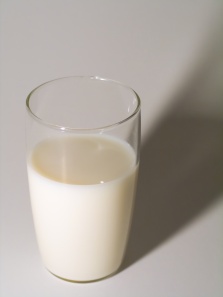
You may be trying to cut down your dairy intake, be intolerant to milk or be vegan – but what dairy alternatives can you use?
Soya Milk
Soya milk is made from “soaking, grinding and boiling soy beans with water” (6 Health Benefits of Soy Milk) and is great in coffee as it has a creamy flavour, whilst being low in fat. Soy milk is a source of protein, but only contains soy protein, rather than whey and casein found in cows milk, both of which are good for building muscle. Soy protein has been found to reduce LDL (bad) cholesterol and increase ‘good’ HDL cholesterol (Skim Milk vs. Soy Milk: The Greatist Debate).
Almond Milk
“Almond milk is made from ground almonds and is lower in calories than other milks as long as it is unsweetened” (Almond Milk vs Cow Milk vs Soy Milk vs Rice Milk). Almond milk has a light and subtle texture however it is not a good source of protein. “While a glass of cow milk or soy milk has 8 grams of protein, a glass of almond milk has a single measly gram” (Should I Drink Almond Milk?). Unless fortified, almond milk is also low in calcium.
Rice Milk
“Rice milk is the most hypoallergenic of any of the milk alternatives and is often free of soy, gluten and nuts. It is made from boiled rice, brown rice syrup and brown rice starch. Rice milk is high in carbohydrates and low in protein compared to dairy milk. As it is quite thin and watery, rice milk is not especially well suited for use in cooking or baking. Rice milks is not naturally rich in calcium, so it is sensible to choose a variety that is fortified with this mineral if it is intended to replace cow’s milk” (What are the alternatives to drinking dairy milk?)
Coconut Milk
Coconut is the milk alternative with the texture closest to whole cow’s milk . Coconut is high in saturated fats, however “the saturated fats found in coconut milk are mainly short and medium chain fatty acids, which are usually not stored by the body as fats. Instead, such short and medium chain fatty acids have been found to provide instant energy to the body” (Coconut Milk: Benefits, Side Effects, Nutrition and Facts). Like some of the other milks discussed here, coconut milk is low in protein and calcium.
The Verdict
All the milk alternatives have pros and cons, however which one is ‘best’ is all down to personal preference and what you are using the milk alternative for. Personally, we love coconut milk in curries and love almond milk in milkshakes… But are pretty partial to a glass of ‘moo juice’ on our cereal!
